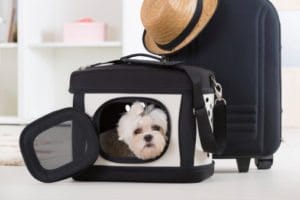Canadian airline Air Canada will no longer be required to provide special accommodations for those with dog allergies, according to a 2015 decision by the Canadian Federal Court of Appeal.
The appeal follows a 2013 ruling by the Canadian Transportation Agency that mandated that the airline create a five-seat buffer zone between pet or service dogs and those with severe canine allergies. That CTA ruling also said that if a dog-allergic passenger was flying on an aircraft that did not have a High Efficiency Particulate Air (HEPA) filter or provide completely unrecirculated fresh air, dogs would be banned for that flight.
These were essentially the same regulations that the CTA applied to people allergic to cats in a decision in 2012.
Cat Difference Argued
However, the appeal court found the CTA ruling did not adequately consider Air Canada’s argument that cat dander stays airborne longer than that of dogs and given these inherent differences between the two allergens, the same rules and accommodations do not need to be made for those with dog allergies.
Air Canada further contended the new regulations would cause discrimination against those with service dogs.
“I have no hesitation in saying that common sense has not prevailed in the present matter,” wrote Justice Marc Nadon, one of the three judges on the deciding panel. “The agency determined important issues, not only for the applicant and all those having dog allergies, but also for Air Canada …. Had common sense prevailed, one would have expected the agency, at some point in time, to realize that it was disposing of these important issues without, in effect, the full participation of Air Canada.”
WestJet, another major Canadian airline, notes in their allergy policy that they will create a buffer zone of five rows between passengers carrying cats and those with cat allergies, as long as they are notified of the allergies at least 48 hours prior to travel. Dogs, small birds, and rabbits are also allowed to be carried on board, but the buffer zone policy does not apply to other pet allergies.
Asthma Groups Disappointed
Asthma organizations were dismayed by the ruling and the Air Canada’s decision to appeal. “We are disappointed that Air Canada decided to put the needs of pets and their owners over the health and safety of passengers with a severe allergic disability,” said Rob Oliphant, president of the Asthma Society of Canada. (About 80 percent of asthma is allergy-based and exposure to pet dander is a common trigger).
“At a time when accommodation for people with disabilities in Canada is becoming more commonplace, Air Canada is taking a step backwards and putting their passengers at risk,” he said.
This appeal court ruling is also at odds with recommendations from the association representing Canada’s doctors. “The Canadian Medical Association recommends a ban on all pets, except for certified service animals, travelling inside the aircraft cabin on all Canadian passenger planes,” says a resolution from the association’s 2011 annual meeting.






